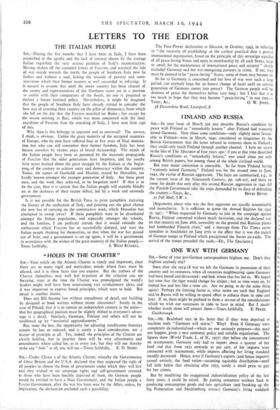THE ITALIAN PEOPLE
LETTERS TO THE EDITOR
Sta,—During the five months that I have been in Italy, I have been astonished at the apathy and the lack of interest shown by the average Italian regarding the very serious problem of Italy's reconstruction. Having shaken off the corroded fetters of Fascism, and watched the tide of war recede towards the north, the people of Southern Italy now lie listless and without a soul, licking the wounds of poverty and semi- starvation which their former masters so well succeeded in inflicting. It is natural to assume that until the entire country has been cleared of the enemy and representatives of the Northern states are in a position to confer with their compatriots of the South, no one is prepared to declare a future national policy. Nevertheless, it might be imagined that the people of Southern Italy have already started to consider the best way of resetting their country on the pillar of democracy, from which she fell on the day that the Fascists marched on Rome; but except for the recent meeting at Bari, which was more concerned with the final expulsion of Fascism than the remaking of Italy, I have seen little sign of this.
Why then is this lethargy so apparent and so universal? The answer, I think, is obvious. Unlike the great majority of the occupied countries of Europe, who by now have suffered four or five years of Nazi domina- tion but who can still remember their former freedom, Italy has been beaten senseless by twenty years of brutal dictatorship. The minds of the Italian people have been so poisoned by the incessant propaganda of Fascism that the older geherations have forgotten, and the youths have never learned about the great struggle by the Italians at the begin- ning of the century to achieve unity and democracy within the country. Today, the names of Garibaldi and Mazzini, erased by Mussolini, are hardly known amongst the younger generation of Italy. Are these great men, and the work they achieved, to be forgotten now? If that is to be the case, then it is certain that the Italian people will stumble blindly on in the darkness of their recent defeat, led by a weak and unsteady government.
Is it not possible for the British Press to print pamphlets narrating the history of the unification of Italy, and pointing out the great chance she Maw has of carrying on the constructive work, which Mussolini has attempted to sweep away? If these pamphlets were to be distributed amongst the Italian population, and especially amongst the schools, and the families, I am perfectly certain that it would rekindle the enthusiasm which Fascism has so successfully damped, and start the Italian people thinking for themselves, so that when the war has passed out of Italy, and a government is set up again, it will be a government in accordance with the wishes of the great majority of the Italian people.—


























 Previous page
Previous page